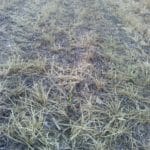Washing Away Our Black Gold
I needed to keep my hands on the wheel and my eyes on the road Tuesday while motoring through driving rain, thunder and lightning, but I was able to take many disheartening glimpses of water and Iowa farmland running in rapids through the fields, even out onto the roads.
Iowa has lost a tremendous amount of its black gold soil this week. A tragic loss, and the intense rains are forecasted to continue after the weekend.
One member reports: “There are ephemeral gullies everywhere, even in no-till fields. It is so hard to look at all the erosion. I think almost every river in Iowa is in flood stage. This is the most difficult spring I remember. I recall my Dad finishing planting corn on Memorial Day in about 1965, the latest he ever planted.”
Another member writes: “Easily the worst spring in history around here. 20 inches of rain since April first. All of Northern Iowa has had severe erosion.”
On Tuesday, the closer I got to the PFI offices in Ames, though, the more my resolve strengthened to continue the work at Practical Farmers to keep our black gold covered whenever possible. We need more farmers planting cover crops and third crops. We need to make sure that grass-based operations –where the land is permanently covered–prove profitable.
There is so much to do, and so many of you already doing it, and others ready to start!
Check out the accompanying photo here, of corn emerging in a rye cover crop from Mark and Melanie Peterson’s farm. A mat of living or dead cover crop or well managed pastures can absorb the raindrop’s energy, reducing the amount of force from heavy, intense rainfalls. Keeping the soil covered through the spring planting season, the time of the most intense rains, keeps that soil in place. “What happens on the farm needs to stay on the farm,” Mark says.
A couple of years ago, Practical Farmers started our very successful “don’t farm naked” campaign to call attention to the need for cover crops. Our campaign slogan is a light-hearted one, but the erosion problem it addresses is one that threatens our future. As David Montgomery points out in Dirt: The Erosion of Civilizations: Our soil is the root of our existence, supporting our feet, our farms, our cities.

